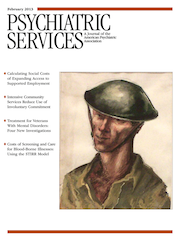Rewards of Caregiving and Coping Strategies of Caregivers of Patients With Mental Illness
Abstract
Objective
The study sought to broaden the focus of research on caregivers’ burden by examining caregiving rewards and their relation to coping skills.
Methods
Data from semistructured interviews with 60 family caregivers of patients with mental illness in Germany were examined by content analysis. Information was gathered with the Freiburg Questionnaire on Coping With Illness. Both t tests and regression analyses were used to analyze data.
Results
Caregivers made 413 statements about rewards, which were assigned to six categories. “Gratitude and affection from the patient” was the most frequently cited, and “active, problem-oriented coping” was the coping strategy most used. Three variables predicted identification of a greater number of rewards, explaining 39% of variance: “increased religiousness and searching for meaning,” “caregiver’s younger age,” and “more statements about burden.”
Conclusions
To support caregivers, a shift in orientation from focusing on burden to emphasizing resources is necessary.



